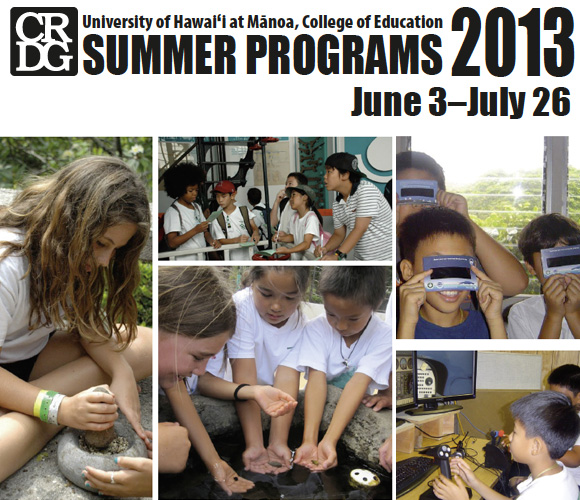
Grade 3
LIFE / OLA
Students identify and observe various plants and animals that make up our local environments. They will learn about the interconnections between plants and animals in these environments. Explorations may include how did life get to Hawai‘i; how does life adapt to the environment and to sharing that environment; and how do we, humans, interact with the plants and animals around us.
Grade 4
WATER / WAI
Students focus on the rhythms and life of freshwater and saltwater environments in and around our island home. They identify unique interconnections between physical conditions and life forms found at mountain streams, sandy beaches, rocky tidal zones, and the ocean. Students will investigate Hawai‘i’s unique water cycle.
Grade 5
AIR / LEWA
Students explore Hawai‘i’s brilliant sky and tropical atmosphere. Studying the interconnections between life in the islands and the airways above them students will investigate the challenges of traveling through the air. Using the techniques of both ancient explorers and modern researches, students track weather systems and learn their effects on humans and nature. Students will examine the various ways humans can harness a sustainable source of energy for the future.
Grade 6
EARTH / AINA
Students will explore Hawai‘i’s formation and development from a geological point of view. The class will investigate various weathering and erosion patterns during their many fun-filled field experiences! Students will search for ways to maintain a sustainable relationship with our unique island environment and the challenges it poses. In interconnectedness of humans and the land will be a driving force of inquiry during the summer.
Grade 6-8
MOUNTAIN/OCEAN // MAUKA/MAKAI
The mauka/makai experience is a two-year, cumulative investigation of the Hawaiian Islands as a whole. Students will have the opportunity to take past knowledge and synthesize it into a better understanding of the world around us. During the Mauka summer, students will explore the geo-evolution of our islands, the common inhabitants of our terrestrial world, conduct a fresh water stream study, and discover the past and present use of our islands. Within the Makai scope of the program, students will enjoy a summer filled with the exploration of our near shore environment; studies will include animal life, ancient and modern collection and use, and understanding the shore dynamic.Students are not required to participate in both years, but doing so will complete the experience.
Grades 5–7
DRAMA
In this two-part program, students become both playwrights and actors, experiencing the production of a play from the development and creation of an original script to the performance of that script in front of a live audience. Using the Golden Triangle of CRDG’s Performance English program, students come to understand the scriptwriting process by learning how to develop ideas, write dialogue, and describe sensory details. They explore creative movement, pantomime, and improvisational skills that culminate in an end-of-summer show for family and friends.
Grade 9
A MODELING APPROACH TO ALGEBRA
A modeling Approach to Algebra class will be held in the morning from 8:00 am – 11:45 am. It will not be offered in the afternoon program.
What mathematics is there in the game of billiards? How can you figure out someone’s height by knowing the length of his or her femur (thigh bone)? What is the best price to ask for a used car you are selling? The answers to these questions all involve algebra. In A Modeling Approach to Algebra, a dynamic lab-type math course for students entering ninth grade, students will conduct mathematical investigations and solve problems that help build understanding of algebraic ideas and techniques and of how algebra is useful in our everyday lives. Investigations will involve practical and interesting questions that may be either applied or drawn from pure mathematics. Students will use modeling to interpret problem situations; understand the goals of a problem; represent, test, and revise various approaches to solving the problem; and report on results.
Grades 10–12 (June 10–21, 2013)
DRIVER’S EDUCATION (8:30 a.m.–12:00 p.m.)
Emphasizing the techniques of defensive driving, this course equips students with the skills necessary to be a safe and sensible driver. By creating a “Skills Project Book,” students take a proactive role in learning the rules of the road, thereby aiding their development as young drivers. This course provides the thirty hours of classroom instruction and six hours of behind-the-wheel instruction required by state law. Driving time will occur outside of class time and will be scheduled on an individual basis with the instructor. Students must be at least 15 1/2 years old to enroll.
The instructor will lead an optional parent information night on Wednesday, June 24. Topics to be discussed may include changes to the state laws, the new provisional license phase, and tips for driving with instructional permit holders.
Optional Parent Night
June 12, 2013
6:00 p.m.–7:00 p.m.
Driver’s Education classroom